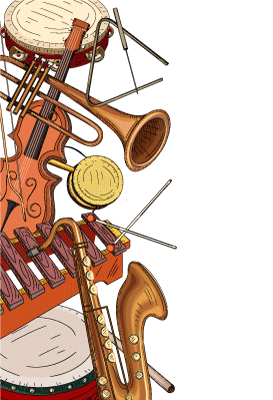What Is The Best Brand of Beginner Instruments?
by: Richard Maldonado
There isn’t a "best" brand, but there's more to it than that

The thing about “the best,” whether you’re discussing cars, movies, or tacos, is that it’s all extremely subjective. We all know this, but here you are, looking for that saxophone or trumpet that is going to make your student the envy of all other parents while simultaneously earning them a full ride scholarship to Julliard. It’s natural to want the best for your child. The fact that you’re doing your research says you are also looking for an outstanding value and not just rushing out to buy a professional instrument (and if you’re thinking about it, don’t. Here’s a link where we explain Why Professional Horns Are Terrible for Beginners, where we break down exactly what you need, and don’t need in a beginner instrument.)
So instead of focusing on any single brand, let’s look at a few of the top choices. A lot goes into making the cut. (If you want to skip ahead, you can jump to our Top Brands for Beginners below and get right down to it.) For any instrument you may be researching, you should consider the following (in no particular order):
- Musical quality & ease of playability - simply put, an instrument needs to make music. That’s its purpose. Harsh tones, dead notes, and overall unresponsiveness all make for one miserable student musician. Even worse, the child will often blame themselves, thinking they lack ability when it might be the instrument holding them back. A professional musician can make anything play well, but a beginner needs an instrument that will be forgiving and allow them to learn the fundamentals of musical expression.
- Intonation - This was almost included in musical quality, but it’s important enough to mention on its own. If you aren’t familiar with the term, intonation refers to pitch accuracy (playing a note “in tune.”) An instrument may have good tone or respond well, but that’s almost meaningless if it can’t play in tune with itself and with the band. Even for the musically uninformed, bad notes are one of the most noticeable mistakes a musician can make. Tone, technique, and characteristic sounds come with time and practice, but this foundation must be built on solid intonation.
- Manufacturer’s reputation - Even the best manufacturers will occasionally have a lemon. What’s important is how they deal with such an instrument. Does the manufacturer have strict quality control standards to avoid a problem horn ever reaching their customers? Do the stand behind their product if something goes wrong? Are their products consistent from instrument to instrument? And lastly, are they responsive to their customers when an issue is brought to their attention? Any “Top Brand” should be a brand that answers “yes” to these questions.
- Durability - Let’s face it, these instruments will be in the hands of children. The very same children who have found ways to break almost every unbreakable toy or device you ever got for them. That’s not to say your child isn’t careful, but they are still children and things do happen. Instruments need to withstand accidental damage as well as the lax maintenance a beginner might be guilty of. Unfortunately, durability can sometimes come at the cost of musicality. Any of our “Top Brands” do their best to balance the two.
- Cost of repair & availability of repair parts - If the instrument does need to be repaired, is the cost of repair going to be more than the cost of replacing the instrument? That instrument that seemed like a bargain will leave you frustrated if the cost of any repairs exceed the instrument’s value. The brands that made our list are from manufacturers who have parts readily available. Most importantly, they make instruments that will continue to give you years of service, even after a few repairs.
- Will the instrument be accepted at another school if we move? - This is one that may not be a consideration for everyone, but it’s still something to keep in mind. Some schools might have strict brand requirements, going so far as asking parents to return an instrument not from their approved list. It might seem like the director is simply being “too picky” but they might have had a bad experience with a brand of instruments and feel like it’s in the student’s best interest to exclude that brand.
- Value - At the end of the day every parent wants to feel like they are getting a great product at a fair price. While “you get what you pay for” may be a bit cliché, rushing out and buying the most expensive instrument out there really doesn’t make sense either. Fortunately, most student instruments from major manufacturers are priced very competitively. These brands are not only a good value in the short term, but are also made well enough to last for years.
There are brands that favor one or two of these points and in doing so, sacrifice others. You want a balanced approach. Cost should reflect quality and craftsmanship, but not be so high that it’s unreasonable for the level of instrument (if you aren’t sure what I mean by “level of instrument”, you can read more about The Differences Between Student, Intermediate and Pro Level Instruments.) To make the list of “Top Brands”, I feel like it is important to cover almost all these points, though there is a little bit of “wiggle room”. There are some fantastic instruments that may not be accepted at certain schools and it would be a disservice to not include them when they check off every other point.
The Top Brands
Every brand listed below represents a combination of the factors listed above. It’s important to point out that the list is not ranked, so don’t assume one brand is better than the others based on where it falls. And before I get angry emails with the subject “But brand ‘X’ isn’t on the list!!!”, the purpose behind this list is to take a snapshot of the best brands today. There may be brands that once were at the top of heap but have either been discontinued or fallen out of favor. Also remember, these are my opinions based on my 15 years in the musical instrument business helping thousands of families across all demographics. Your musical mileage may vary.


Bach
Part of the Conn-Selmer family of brands, Bach manufactures brass instruments of all levels. Having produced trumpets and trombones for almost 100 years, Bach instruments have long enjoyed a place of respect amongst musicians. There student instruments are well built yet maintain the expressive musical quality the professional models are known for.

Buffet
Regarded by some as the “Gold Standard” for professional clarinets, Buffet has been a fixture of the woodwind world for close to 200 years. In that time, they have maintained an exceptional reputation across their entire line of instruments. Many clarinet players that start on Buffet are lifelong loyalists which speaks to the special place their instruments hold among musicians.

Gemeinhardt
Though they recently began making clarinets and saxophones, Gemeinhardt is probably best known for their flutes. A staple of the industry for many years, every flautist you ask will probably be familiar with the Gemeinhardt name. This mainstay of the flute section in many band halls will stand up to almost anything your student will throw at it, and sound great doing it.

Getzen
Beginning with trombone manufacturing in 1946, Getzen soon branched into trumpets and gained a reputation for excellent craftsmanship and superior tone. Known for some of the best trumpet valves and trombone slides in the industry, Getzen student horns often have features and manufacturing techniques found on step-up and professional instruments.

Jupiter
Jupiter is a relative newcomer on this list, but still has over 40 years of band instrument manufacturing experience. In this comparatively short amount of time, Jupiter has been able to gain significant market share by being responsive to the needs of the industry and maintaining their dedication to music education. Every year, more band directors are recognizing these instruments for their outstanding value.

Selmer
Another member of the Conn-Selmer family of brands, Selmer is probably best known for their outstanding pro-level saxophones. That doesn’t take away anything from their finely crafted clarinets, bass clarinets and bassoons, it’s just a testament to their near-legendary professional saxophones. Despite their pedigree, or perhaps in light of it, Selmer manages to make affordable student instruments found in band halls all across the country, if not the world.

Yamaha
The brand that needs no introduction. What’s interesting about Yamaha is that they enjoy brand recognition across multiple industries. From motorcycles to band instruments, Yamaha products are well regarded for their craftsmanship and durability. Producing woodwind, brass and percussion instruments, there are very few beginner preference-lists that don’t include Yamaha.
Parting Thoughts
You probably noticed some common traits shared between all of the brands. A heritage built on quality, customer service and continual innovation. What you might not know is that these are the same brands band directors are recommending to their students. It’s easy to be drawn in by clever marketing gimmicks or rock-bottom, bargain prices when you aren’t sure what you’re looking for. The Top Brands laid out here stand out to industry insiders and music educators for their actual performance and value. They are expressive, quality musical instruments designed specifically with the beginner musician in mind. No director wants to have students miss valuable instruction time by having an instrument in a repair shop instead of a student’s hands.
So, if there is only one thing you take away from this, it’s to trust your band director’s experience and expertise. They know what works and what doesn’t for their program and their students. Look at their list of beginner instruments and compare it to the brands above. Hopefully, between the two, you’ll feel better able to make an informed decision for you student’s musical future.



